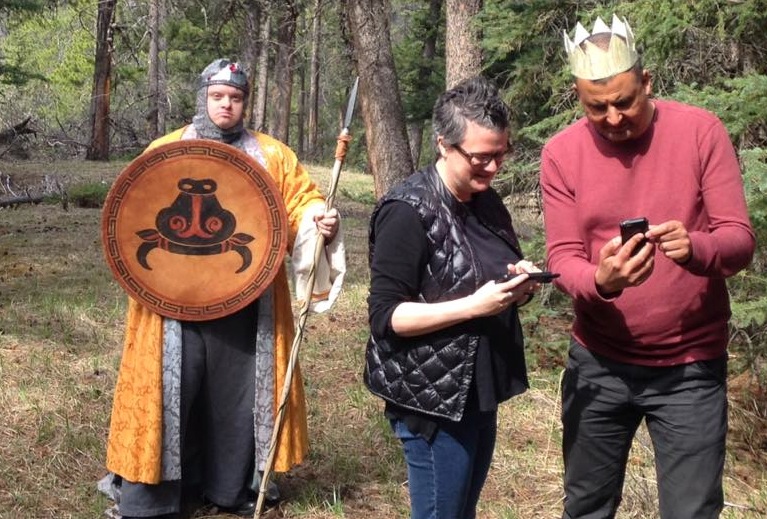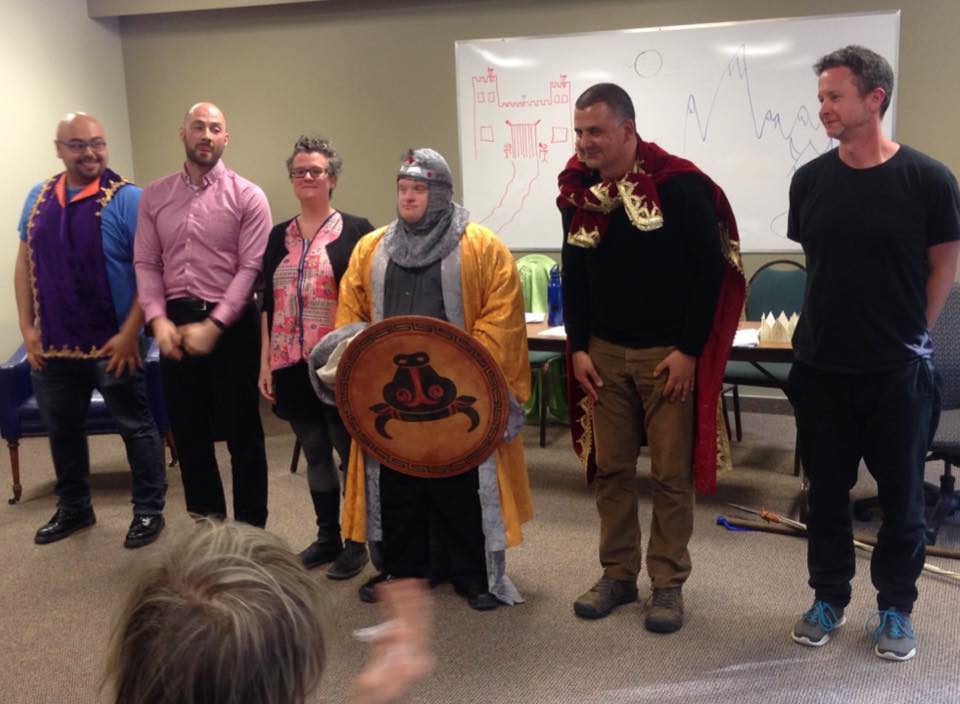
Niall McNeil and I have been co-writing, since 2009, when Lois Anderson, then of Leaky Heaven, proposed a commission that would respond to Niall’s long held desire to write an adaptation of Peter Pan. Lois’ idea was that a way to achieve that might be he and I writing together, because among many other things, Niall’s life experience includes Down syndrome, which limits his ability to write in the traditional sense. The result was the 2011 Leaky Heaven/Neworld co-production, Peter Panties, which was, for me, the single most challenging and gratifying creative collaboration I have ever experienced.
I am only one of many artists Niall has collaborated with over the course of his life. He was more or less raised on the Caravan Farm Theatre, and has lived, breathed and eaten theatre from pretty much the moment he could speak, a history that led to his long association and collaboration with the now defunct Leaky Heaven Circus.
Niall’s friends and collaborators include some of this country’s great avant-garde and/or populist theatre makers: Steven Hill, Lois Anderson, Paula Jardine, Peter Hinton, James Fagan Tait, Paul Braunstein, Ajineen Sagal, Kelly Barker, Nick Hutchison (etc. etc., the list goes on and on). You’d be hard pressed to name a person in Canada who is more a true person of theatre. It is in his bones, it is his DNA.
You’d also be hard pressed to find any other artist who, on the second day of a workshop of his new play at the Banff Centre, is being lied to by some of his best friends and collaborators, who are telling him that they are going back to their rooms by themselves to “chill out”. They are doing this – lying to their colleague, and pretending not to exclude him – for what feel like absolutely legitimate reasons. Talking about structure is often hard for Niall, especially when it’s director Jamie Long and I moving quickly about how maybe to re-order, or cut something.
Our experience has been that it’s best to jam about this aspect of our work on our own, and then bounce what we’re thinking off Niall later – trying to do it moment by moment in the same room is too stressful for all of us, because of our different cognitive perspectives. So when we found ourselves living together at the Colony, I became quite anxious about how to find time alone with Jamie, so that we could do some of this work, especially because our time-frame – as always in theatre – felt limited.
“I’m going to my room,” I said, as we walked across the pedestrian bridge from the dining room towards our rooms in Lloyd Hall. “Me, too,” said Jamie. “Are you going to be ok?” I asked Niall, knowing that I didn’t actually want to know the answer. “Yes,” Niall said, looking confused, and headed back to his room on his own.

It was Jamie who acted on the shitty feeling we both had. He called Niall later, and Niall told him that he wasn’t happy and wanted to go home. Jamie and I then met with Niall’s friend and sometimes paid companion, Lucy Cairns.
“I understand,” she said. “You guys have work you have to get done. But I also think you have to remember that being at a place like Banff is also about the time you all get to hang out, and just be excited about being at a place like Banff. That’s really important, too.”
“Yes,” we said. “We agree.”
And we did. And over the next few nights we worked less and hung out more, and all started to have a really good time.
What’s interesting: the next day, one of us (Jamie, or Lucy, I can’t remember) had a conversation with Niall where he explained that sometimes it’s really important for the play that Jamie and I be able to talk a little about structure on our own, just like sometimes Veda goes away and composes music by herself. And so the next time we hit a place where we needed to deal with that, Niall was, I wouldn’t say happy, but more than willing to let us do a bit of work on our own.
I’ve been working with my friend and colleague Niall for 8 or 9 years, more or less. And somehow, because of me, or my conditioning, or the challenge of communicating across certain kinds of difference, it never occurred to me to first try explaining to my friend and colleague what I wanted, and why. My first instinct after almost a decade of work with him was to lie, and obfuscate, and hide. Because – I thought to myself – I need to do this work. Because – I thought to myself – I don’t want to hurt him. Because, I don’t know what else to do.
For me there’s something important in that – about inclusion, and exclusion, and what our work actually is. Recently, Niall’s mom Joan told me that Niall had coined a new word for inclusion. “I know exactly what it is,” he told her. “Confusion.” We laughed for a while after she told me that. And I told her that’s exactly why I love working with Niall so much.
With thanks to Lucy Cairns, who I consider a deeply gifted and loving friend and companion, to Niall, to the project, and to us.
Our project is called King Arthur and His Knights, or King Arthur’s Night, or Lay Down Your Hearts. We’ll see which one sticks. It’s co-written by myself and my longtime friend and colleague, Niall McNeil, and collaborator Lucy Cairns, and created in collaboration with director James Long and composer/musical director Veda Hille, and it’s been commissioned by the Luminato Festival in Toronto. We just concluded a week in workshop at the Banff Centre Playwrights Colony.






